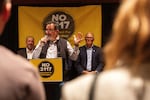
Proposed by Washington Gov. Jay Inslee, the Climate Commitment Act was passed by the state's Democrat-controlled Legislature and signed into law in 2021. An attempt to repeal it was voted down in November.
Parker Miles Blohm / KNKX Graphic
Washington state voters upheld one of the most ambitious climate laws in the U.S. in November, by rejecting a ballot initiative that would have repealed the state’s landmark cap-and-invest law, the Climate Commitment Act.
This comes as a new Donald Trump administration is expected to roll back federal climate policies.
The Climate Commitment Act took effect in 2023. It puts a cap on carbon emissions and raises billions of dollars for programs that help the state prepare for and adapt to climate change. One of the largest polluters in the state actually supports this law and framework.
Climate action advocates all around the country say Washington’s law should be a blueprint for other states, as they aim to transition to greener jobs and wean their industries off of fuels that pollute the air with climate-warming carbon emissions.
“A state will never regret making their state more climate resilient,” said Costa Samaras, director of the Scott Institute for Energy Innovation at Carnegie Mellon University.
He said cities, states and organizations throughout the U.S. will be looking to Washington as an example, as climate action shifts to the state and local level.
“A law like Washington state’s law gives a model, gives results and gives quantifiable benefits to say to other states and other institutions that are thinking about this that it both works and that voters approve of it,” Samaras said.
Washington’s program is modeled on California’s. At least three other states - New York, Pennsylvania and Maryland - are actively considering similar systems.
This year, a voter initiative sought to overturn Washington’s law. The initiative was led by Brian Heywood, a hedge fund investor, who moved to Washington from California for tax advantages.
He argued that cap-and-trade carbon markets are ineffective at reducing pollution, but good at quickly driving up gas and energy prices.
On election night and in the weeks after it, Washington Gov. Jay Inslee, a third term Democrat, touted his state’s success in preserving the new carbon market system.

Suquamish Tribal Chairman Leonard Forsman speaks at the "No on I-2117" campaign party in Seattle on election night, Nov. 5, 2024. Washington Gov. Jay Inslee stands to his right.
Parker Miles Blohm / KNKX
Inslee was joined by leaders of several other groups in the “No on I-2117” coalition. He called the resounding 61% election result “a thrashing” and praised his state for providing hope for the rest of the country and the world, even as Republicans took the White House and both chambers of the U.S. Congress.
“I am thrilled that we are a beacon of light to the rest of the country,” he said on a media call in the run up to the U.N.‘s climate talks in Azerbaijan.
Inslee gave multiple speeches at the talks, in his capacity as a co-founder of the U.S. Climate Alliance, a bi-partisan coalition that includes 24 states. He also joined another group in attendance there, called America is All In. It represents multiple cities and local governments, plus businesses and cultural institutions. Together, they say these coalitions represent at least 55% of the U.S. population, and 60% of the U.S. economy.
A gold standard – tested
Policy experts and advocates have described Washington’s Climate Commitment Act as ‘the gold standard’ of state climate laws.
By auctioning off carbon allowances to big polluters like oil refineries and steel plants, Washington’s law has raised more than $2 billion since taking effect in 2023. The state has budgeted $3.2 billion of climate spending through 2025, based on projections of the auction revenue.
That money has to be spent on climate initiatives, everything from electrifying buses and ferries to moving tribal nations that face sea-level rise to higher ground – to providing free transit passes statewide to youth aged 18 and younger.
It also requires that over a third of the money be spent in communities overburdened by pollution — and that 10% of auction revenue go to tribes. These priorities were brokered over a decade of deal-making, as the Inslee administration worked to get agreement from affected constituents and was forced to provide funding to address the needs of front-line communities.
Criticism flared before the election over gas prices. Critics of the climate law said Washington’s system will force everyone to pay more for gas, amounting to a regressive tax on drivers.
In Washington, oil companies do not fully disclose their accounting, so the exact cost remains unknown. But they don’t deny that these new costs will be passed along at the gas pump. Estimates range from 20-60 cents per gallon, based on state-commissioned economic analysis, mainly through comparisons to Oregon prices.
Inslee faced blowback for stating early on that the cost per gallon would be “pennies.” In reality it went up far more than that, though that could be attributed to many other factors as well.
Advocates say voters showed they cared more about the benefits provided by the Climate Commitment Act than the cost — especially as they see the effects of climate change around them: a record-breaking heat dome event in 2021, warmer water off the coast, shrinking glaciers in the majestic North Cascades mountains. These effects literally hit home — and voters in Washington showed that they want action.
“I think it demonstrates that so many people have concerns about climate change,” said Becky Kelley, a senior climate adviser to Inslee.
She said there are multiple environmental and climate laws that Washington state has passed that are the underpinnings of the Climate Commitment Act. And these continue, regardless of the new federal administration coming into office in January.
These state initiatives include a law that commits the state to 100% clean electricity by 2045. There’s also a clean fuel standard to reduce transportation emissions and the HEAL Act that requires most of Washington’s state agencies to take environmental justice into account as they conduct research, plan and allocate spending.
“All of those things cannot be preempted by the federal government. They just can’t,” Kelley said. “That’s where a lot of our progress is going to come from in Washington.”

Samuel Tekle drives freight for Afar Trucking in Seattle and Tacoma. He's a short-haul or 'drayage' trucker, moving containers between different modes of transit after they are unloaded from ships in the ports. Electrifying the drayage system to eliminate harmful particulate pollution from diesel engines is one of the priorities addressed by Washington's Climate Commitment dollars.
Parker Miles Blohm / KNKX
A global market
The Climate Commitment Act was crafted by a broad coalition of stakeholders, including environmental groups, Washington tribes and big employers. Even an oil refinery was at the table when the law was crafted. Its owner, energy giant BP, was glad to see the law upheld by voters - the company supported the “No on I-2117” campaign.
“BP, globally, understands that climate change is real,” said Tom Wolf, who manages government affairs and is based at BP’s Cherry Point refinery in Blaine, Washington.
“Our core business of oil and natural gas creates carbon and its production —its use, that’s not sustainable,” he said. “So, over a transitional period, 2050, or sooner, we want to be a net zero company globally.”
He said they believe the market will move that way, regardless of what happens locally.
“This is not just the U.S. This is a global market,” Wolf said. “A lot of countries around the world, 190-some of them, understand the importance of climate change and how we need to create a future with less carbon.”
Wolf said being at the table for negotiations that set the framework of the Climate Commitment Act allowed BP to get significant financial rewards — or “carrots” — for making their refinery more efficient— upgrades, he said, that they needed to do anyway.
BP also got some free allowances, initially, because the state legislature acknowledged it as a trade-exposed business, which faces unique challenges in reducing greenhouse gas emissions. But Wolf said the “sticks” of more compliance will come later, as Washington lowers its cap on carbon pollution.
Wolf said BP is eager to see Washington’s market merge with its equivalents in Quebec and California. A larger market is expected to bring down costs for the regulated polluters and make climate action more efficient.
Negotiations on the mechanics of the so-called “linkage” of these three independent systems are expected to start next year.
Less than two years after enactment of Washington’s climate framework, its effectiveness is still an open question. The data on state carbon emissions — and how it will be measured and compiled — may take years to come together in a way that yields any meaningful answers.
As the nation’s political and climate landscape continues to evolve, politicians, policymakers, and voters will continue to watch what happens in Washington.

Chum Salmon swim upstream in Seattle's Carkeek Park, in December 2024. Restoration of fish habitat is one of many things that are funded in Washington state's Climate Commitment Act.
Bellamy Pailthrop / KNXK
This story comes to you from the Northwest News Network, a collaboration between public media organizations in Oregon and Washington.
It is part of OPB’s broader effort to ensure that everyone in our region has access to quality journalism that informs, entertains and enriches their lives. To learn more, visit our journalism partnerships page.